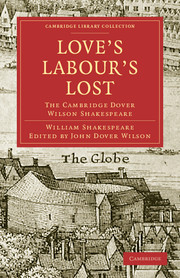INTRODUCTION
Published online by Cambridge University Press: 07 September 2010
Summary
Critics have dealt harshly with Love's Labour's Lost, and commentators—it may be for that reason—neglectfully. ‘In this play,’ says Johnson, ‘which all the editors have concurred to censure, and some have rejected as unworthy of our Poet, it must be confessed that there are many passages mean, childish and vulgar; and some which ought not to have been exhibited, as we are told they were, to a maiden queen.’ He adds, however, a saving clause—‘But there are scattered, through the whole, many sparks of genius; nor is there any play that has more evident marks of the hand of Shakespeare.’ Dryden had classed it, in his Defence of the Epilogue, among the plays ‘which were either grounded on impossibilities, or at least so meanly written that the comedy neither caused you mirth nor the serious part your concernment’—relegating, we assume, Love's Labour's Lost to the second of these categories. Hazlitt, the avowed impressionist, confesses, ‘If we were to part with any of the author's comedies it would be this’. To the good Gervinus it ‘gives the idea of an excessively jocular play’: and even to Brandes Shakespeare seems here to bury himself in the follies he attacks and ‘is still too inexperienced to realise how he thereby inflicts upon the spectator and the reader the full burden of their tediousness’. All this bewilders us who would, if only for its poetry, rank Love's Labour's Lost well above The Two Gentlemen of Verona or The Comedy of Errors, its nearest competitors among Shakespeare's juvenile efforts.
- Type
- Chapter
- Information
- Love's Labours LostThe Cambridge Dover Wilson Shakespeare, pp. xxiv - lviiiPublisher: Cambridge University PressPrint publication year: 2009First published in: 1962

